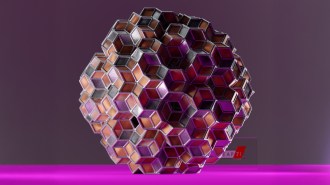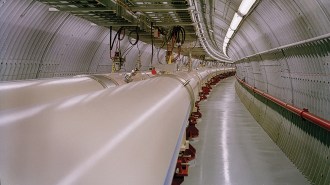First programmable quantum computer
Ultracold beryllium
ions are at the heart of the first programmable quantum computer, an
advance that brings scientists closer to harnessing the power of
quantum systems for general computing. The new system, researchers
report in Nature Physics, flexed its versatility by performing 160 randomly chosen processing routines (SN: 12/19/09, p. 13).
Researchers at the National Institute of Standards and Technology in
Boulder, Colo., based their quantum computer on two beryllium ions
chilled to just above absolute zero. These ions, trapped by an
electromagnetic field on a gold-plated alumina chip, formed the quantum
bits, or qubits, analogous to the bits in regular computers represented
by 0s and 1s. Short laser bursts manipulated the beryllium ions to
perform the processing operations, while nearby magnesium ions kept the
beryllium ions cool (SN Online: 8/6/09).
On average, the quantum computer performed the 160 programs accurately 79 percent of the time. The new study is “a powerful demonstration of the technological advances towards producing a real-world quantum computer,” says quantum physicist Winfried Hensinger of the University of Sussex in Brighton, England.
Macroworld entanglement
Scientists have found traces of
quantum weirdness lurking between two superconductors (white squares on
gray, below) that are visible to the naked eye (SN: 10/24/09, p. 12).
Another team has linked vibrations of two separated atom pairs,
entangling a system that approaches the scale of everyday life (SN: 7/4/09, p. 8).
Instant messaging
Physicists report the first successful transfer of a quantum bit between two widely separated, charged atoms (SN Online: 1/22/09).
3-D superflow
New research shows that an iron-based superconductor allows current to flow in three dimensions (SN: 2/28/09, p. 8).
Top discovery
Physicists detect the elusive single top quark (SN Online: 3/10/09).
Heavenly copycats
Special materials that mimic astronomical events, including the trapping of light in black holes and the disruption of planetary orbits, may allow scientists to replicate aspects of the cosmos at the laboratory bench (SN: 10/10/09, p. 10).
Exotic matter
Physicists identify the hallmarks of an exotic state of matter called a supersolid, which exhibits superfluidity and solidity (SN: 4/11/09, p. 13). In the material (right), ultracold rubidium atoms self-organize in a crystalline pattern.
To see or not to see
A proposed cloaking method would allow for surreptitious sensors that could collect and send messages without being detected (SN: 5/9/09, p. 12). Other work suggests that charged particles could reveal the location of even a perfect invisibility cloak (SN: 1/2/10, p. 13).
Skirting the law
In rare cases, tiny clusters of atoms
ricochet off each other faster than their approaching speeds, seeming
to skirt the second law of thermodynamics, a team predicts (SN: 5/9/09, p. 13).
Better messengers
When entangled, a set of six
photons can withstand the hard knocks that would ordinarily erase
quantum information, researchers show (SN: 11/7/09, p. 11).
Another super on the list
When the soft metallic element europium is cooled and squeezed to enormous pressures, it turns into a superconductor (SN: 6/20/09, p. 10).
Higgs hideout
Physicists put new limits on the mass of
the elusive Higgs boson, a proposed subatomic particle that explains
why elementary particles possess mass (SN Online: 3/16/09).
Spinformation
Electron spin states are held stable when researchers swirl spins in a helix, enabling more reliable information storage (SN: 4/25/09, p. 12).
Hot new memory
Controlling the flow of heat could be another way to store digital information, researchers suggest (SN: 1/17/09, p. 10).
Scientific snowball
The final predicted form of stable ice, ice XV, has been created in the lab (structure below), (SN: 10/10/09, p. 10).
Quantum motor running
An electric motor could be built from two ultracold atoms held in a ring by lasers, physicists propose (SN: 7/18/09, p. 14).
Beetles master optics
Cells on the surface of jeweled beetles, C. gloriosa, bend
light in a special circular pattern. Understanding the shell’s
structure might prove useful for designing new optical devices (SN: 8/15/09, p. 12).
Too much of a good thing
An overdose of quantum entanglement can break down quantum computing systems, researchers find (SN Online: 3/23/09).
Polymer, heal thyself
A new material created with a substance derived from shrimp shells could repair itself when exposed to ultraviolet light (SN: 4/11/09, p. 10).
Stretchy salt
Inflexible old salt becomes a softy in the nanoworld, stretching like taffy to more than twice its length, researchers find (SN: 8/1/09, p. 14).







